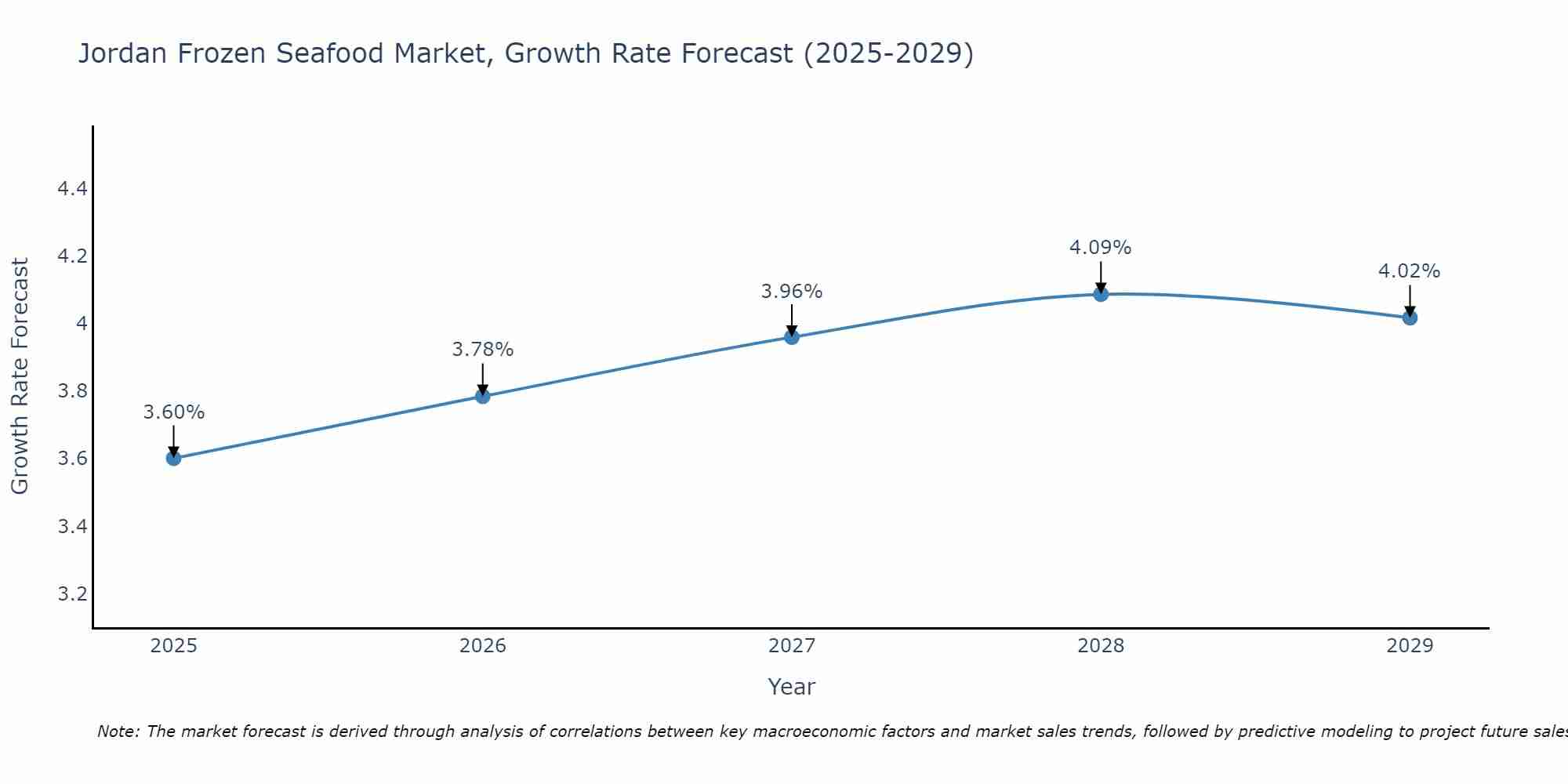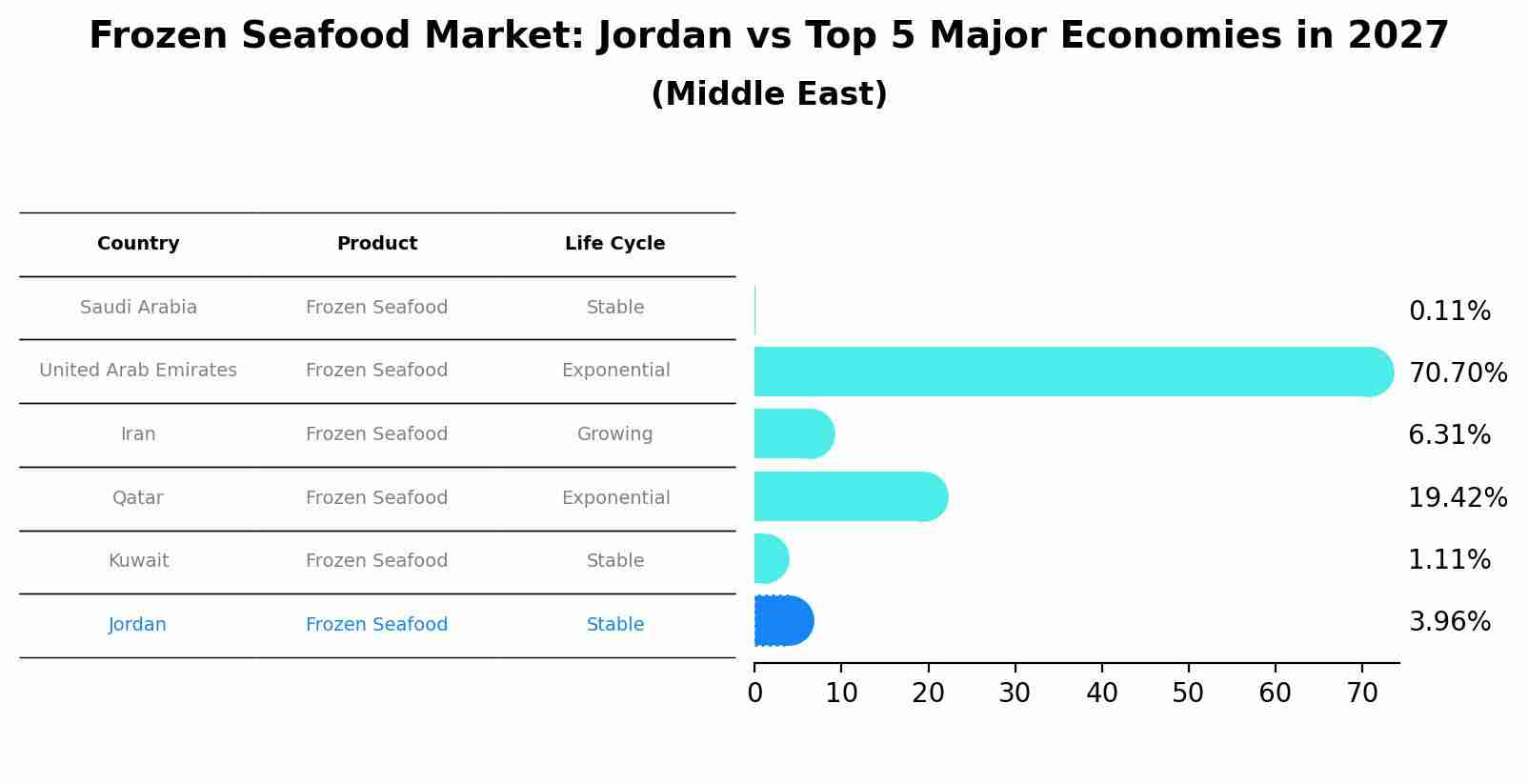Jordan Frozen Seafood Market (2025-2031) Outlook | Industry, Growth, Value, Analysis, Size, Trends, Revenue, Forecast, Companies & Share
| Product Code: ETC386686 | Publication Date: Aug 2022 | Updated Date: Jul 2025 | Product Type: Market Research Report | |
| Publisher: 6Wresearch | Author: Summon Dutta | No. of Pages: 75 | No. of Figures: 35 | No. of Tables: 20 |
Jordan Frozen Seafood Market Size Growth Rate
The Jordan Frozen Seafood Market is projected to witness mixed growth rate patterns during 2025 to 2029. Starting at 3.60% in 2025, the market peaks at 4.09% in 2028, and settles at 4.02% by 2029.

Frozen Seafood Market: Jordan vs Top 5 Major Economies in 2027 (Middle East)
By 2027, Jordan's Frozen Seafood market is forecasted to achieve a stable growth rate of 3.96%, with Saudi Arabia leading the Middle East region, followed by United Arab Emirates, Iran, Qatar and Kuwait.

Jordan Frozen Seafood Market Synopsis
The Jordan frozen seafood market has been experiencing steady growth due to increasing consumer demand for convenient and high-quality seafood products. Factors such as changing dietary preferences, busy lifestyles, and a growing awareness of the health benefits of seafood have contributed to the market`s expansion. Key players in the market offer a wide range of frozen seafood products, including fish, shrimp, and shellfish, sourced both domestically and internationally. Retail channels such as supermarkets, hypermarkets, and online platforms play a crucial role in distributing these products to consumers. The market is also influenced by factors such as pricing, product innovation, and sustainability practices. Overall, the Jordan frozen seafood market presents opportunities for both local and international seafood suppliers to cater to the evolving needs of consumers in the region.
Jordan Frozen Seafood Market Trends
The Jordan Frozen Seafood Market is experiencing growth driven by increasing consumer demand for convenient, long-lasting food options. There is a noticeable shift towards premium and sustainably sourced seafood products, such as wild-caught shrimp and organic salmon. Health-conscious consumers are also driving the trend towards frozen seafood products that are free from additives and preservatives. Convenience and versatility are key factors influencing purchasing decisions, with a growing preference for value-added frozen seafood products like pre-marinated fillets and seafood mix packages. E-commerce platforms are playing a significant role in expanding market reach, offering a convenient way for consumers to access a wider variety of frozen seafood products. Overall, the market is witnessing a trend towards higher quality, sustainable, and convenient frozen seafood options in Jordan.
Jordan Frozen Seafood Market Challenges
The Jordan Frozen Seafood Market faces several challenges, including issues related to product quality and safety, distribution and logistics constraints, fluctuating consumer demand, and price sensitivity. Ensuring the freshness and quality of frozen seafood products can be challenging due to the long supply chain and varying storage conditions. Distribution and logistics challenges, such as inadequate infrastructure and transportation facilities, can impact the timely delivery of products to retailers and consumers. Fluctuating consumer demand, influenced by factors like seasonality and economic conditions, makes it difficult for suppliers to forecast and plan production levels accurately. Additionally, price sensitivity among consumers in Jordan can pose a challenge for frozen seafood suppliers in terms of maintaining competitive pricing while ensuring profitability and product quality.
Jordan Frozen Seafood Market Investment Opportunities
The Jordan Frozen Seafood Market presents lucrative investment opportunities due to the rising demand for convenient and high-quality seafood products in the region. Investors can capitalize on the growing consumer preference for frozen seafood, driven by factors such as busy lifestyles, increasing awareness of health benefits, and the desire for diverse culinary experiences. Key investment avenues include establishing cold storage and distribution facilities, investing in advanced freezing technologies to maintain product quality, and partnering with local seafood suppliers to ensure a consistent and diverse product range. Additionally, there is potential for market expansion by offering premium and value-added frozen seafood products to cater to different consumer segments. Overall, the Jordan Frozen Seafood Market offers promising prospects for investors looking to capitalize on the evolving food consumption trends in the region.
Jordan Agar Market Government Policies
The Jordanian government has implemented several policies related to the frozen seafood market to regulate importation, ensure food safety, and support local fisheries. Import regulations require seafood products to meet specific standards and undergo inspection by authorities to guarantee quality and safety. Additionally, the government has established guidelines for proper handling and storage of frozen seafood to maintain freshness and prevent contamination. To support local fisheries, the government offers subsidies and incentives to encourage domestic production and reduce reliance on imports. Overall, these policies aim to safeguard consumer health, promote sustainable fishing practices, and boost the competitiveness of the Jordanian frozen seafood market.
Jordan Frozen Seafood Market Future Outlook
The future outlook for the Jordan Frozen Seafood Market appears positive, driven by increasing consumer awareness of the benefits of frozen seafood such as longer shelf life, convenience, and improved quality. The market is expected to witness growth due to rising demand for seafood products, changing dietary preferences, and a growing population. With advancements in freezing technology and distribution networks, consumers are likely to have access to a wider variety of high-quality frozen seafood products at affordable prices. Additionally, the trend towards healthy eating and sustainability is expected to drive the market further, as consumers seek out nutritious and responsibly sourced seafood options. Overall, the Jordan Frozen Seafood Market is poised for expansion and innovation in the coming years.
Key Highlights of the Report:
- Jordan Frozen Seafood Market Outlook
- Market Size of Jordan Frozen Seafood Market, 2024
- Forecast of Jordan Frozen Seafood Market, 2031
- Historical Data and Forecast of Jordan Frozen Seafood Revenues & Volume for the Period 2021 - 2031
- Jordan Frozen Seafood Market Trend Evolution
- Jordan Frozen Seafood Market Drivers and Challenges
- Jordan Frozen Seafood Price Trends
- Jordan Frozen Seafood Porter's Five Forces
- Jordan Frozen Seafood Industry Life Cycle
- Historical Data and Forecast of Jordan Frozen Seafood Market Revenues & Volume By Nature for the Period 2021 - 2031
- Historical Data and Forecast of Jordan Frozen Seafood Market Revenues & Volume By Organic Frozen Seafood for the Period 2021 - 2031
- Historical Data and Forecast of Jordan Frozen Seafood Market Revenues & Volume By Conventional Frozen Seafood for the Period 2021 - 2031
- Historical Data and Forecast of Jordan Frozen Seafood Market Revenues & Volume By Form for the Period 2021 - 2031
- Historical Data and Forecast of Jordan Frozen Seafood Market Revenues & Volume By Raw Frozen Seafood for the Period 2021 - 2031
- Historical Data and Forecast of Jordan Frozen Seafood Market Revenues & Volume By Processed Frozen Seafood for the Period 2021 - 2031
- Historical Data and Forecast of Jordan Frozen Seafood Market Revenues & Volume By End Use for the Period 2021 - 2031
- Historical Data and Forecast of Jordan Frozen Seafood Market Revenues & Volume By Food Processing Industry for the Period 2021 - 2031
- Historical Data and Forecast of Jordan Frozen Seafood Market Revenues & Volume By Food Service Industry for the Period 2021 - 2031
- Historical Data and Forecast of Jordan Frozen Seafood Market Revenues & Volume By Retail/Household for the Period 2021 - 2031
- Historical Data and Forecast of Jordan Frozen Seafood Market Revenues & Volume By Product Type for the Period 2021 - 2031
- Historical Data and Forecast of Jordan Frozen Seafood Market Revenues & Volume By Frozen Fish for the Period 2021 - 2031
- Historical Data and Forecast of Jordan Frozen Seafood Market Revenues & Volume By Frozen Molluscs for the Period 2021 - 2031
- Historical Data and Forecast of Jordan Frozen Seafood Market Revenues & Volume By Frozen Crustaceans for the Period 2021 - 2031
- Historical Data and Forecast of Jordan Frozen Seafood Market Revenues & Volume By Distribution Channel for the Period 2021 - 2031
- Historical Data and Forecast of Jordan Frozen Seafood Market Revenues & Volume By Business to Business for the Period 2021 - 2031
- Historical Data and Forecast of Jordan Frozen Seafood Market Revenues & Volume By Business to Consumer for the Period 2021 - 2031
- Historical Data and Forecast of Jordan Frozen Seafood Market Revenues & Volume By E-Commerce/Online Stores for the Period 2021 - 2031
- Jordan Frozen Seafood Import Export Trade Statistics
- Market Opportunity Assessment By Nature
- Market Opportunity Assessment By Form
- Market Opportunity Assessment By End Use
- Market Opportunity Assessment By Product Type
- Market Opportunity Assessment By Distribution Channel
- Jordan Frozen Seafood Top Companies Market Share
- Jordan Frozen Seafood Competitive Benchmarking By Technical and Operational Parameters
- Jordan Frozen Seafood Company Profiles
- Jordan Frozen Seafood Key Strategic Recommendations
Frequently Asked Questions About the Market Study (FAQs):
- Single User License$ 1,995
- Department License$ 2,400
- Site License$ 3,120
- Global License$ 3,795
Search
Thought Leadership and Analyst Meet
Our Clients
Related Reports
- Canada Oil and Gas Market (2026-2032) | Share, Segmentation, Value, Industry, Trends, Forecast, Analysis, Size & Revenue, Growth, Competitive Landscape, Outlook, Companies
- Germany Breakfast Food Market (2026-2032) | Industry, Share, Growth, Size, Companies, Value, Analysis, Revenue, Trends, Forecast & Outlook
- Australia Briquette Market (2025-2031) | Growth, Size, Revenue, Forecast, Analysis, Trends, Value, Share, Industry & Companies
- Vietnam System Integrator Market (2025-2031) | Size, Companies, Analysis, Industry, Value, Forecast, Growth, Trends, Revenue & Share
- ASEAN and Thailand Brain Health Supplements Market (2025-2031) | Strategy, Consumer Insights, Analysis, Investment Trends, Opportunities, Growth, Size, Share, Industry, Revenue, Segments, Value, Segmentation, Supply, Forecast, Restraints, Outlook, Competition, Drivers, Trends, Demand, Pricing Analysis, Competitive, Strategic Insights, Companies, Challenges
- ASEAN Bearings Market (2025-2031) | Strategy, Consumer Insights, Analysis, Investment Trends, Opportunities, Growth, Size, Share, Industry, Revenue, Segments, Value, Segmentation, Supply, Forecast, Restraints, Outlook, Competition, Drivers, Trends, Demand, Pricing Analysis, Competitive, Strategic Insights, Companies, Challenges
- Europe Flooring Market (2025-2031) | Outlook, Share, Industry, Trends, Forecast, Companies, Revenue, Size, Analysis, Growth & Value
- Saudi Arabia Manlift Market (2025-2031) | Outlook, Size, Growth, Trends, Companies, Industry, Revenue, Value, Share, Forecast & Analysis
- Uganda Excavator, Crane, and Wheel Loaders Market (2025-2031) | Strategy, Consumer Insights, Analysis, Investment Trends, Opportunities, Growth, Size, Share, Industry, Revenue, Segments, Value, Segmentation, Supply, Forecast, Restraints, Outlook, Competition, Drivers, Trends, Demand, Pricing Analysis, Competitive, Strategic Insights, Companies, Challenges
- Rwanda Excavator, Crane, and Wheel Loaders Market (2025-2031) | Strategy, Consumer Insights, Analysis, Investment Trends, Opportunities, Growth, Size, Share, Industry, Revenue, Segments, Value, Segmentation, Supply, Forecast, Restraints, Outlook, Competition, Drivers, Trends, Demand, Pricing Analysis, Competitive, Strategic Insights, Companies, Challenges
Industry Events and Analyst Meet
Whitepaper
- Middle East & Africa Commercial Security Market Click here to view more.
- Middle East & Africa Fire Safety Systems & Equipment Market Click here to view more.
- GCC Drone Market Click here to view more.
- Middle East Lighting Fixture Market Click here to view more.
- GCC Physical & Perimeter Security Market Click here to view more.
6WResearch In News
- Doha a strategic location for EV manufacturing hub: IPA Qatar
- Demand for luxury TVs surging in the GCC, says Samsung
- Empowering Growth: The Thriving Journey of Bangladesh’s Cable Industry
- Demand for luxury TVs surging in the GCC, says Samsung
- Video call with a traditional healer? Once unthinkable, it’s now common in South Africa
- Intelligent Buildings To Smooth GCC’s Path To Net Zero


















